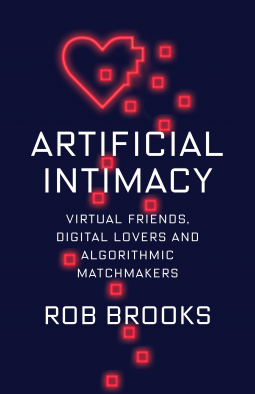
Artificial Intimacy
Virtual Friends, Digital Lovers, and Algorithmic Matchmakers
by Rob Brooks
This title was previously available on NetGalley and is now archived.
Send NetGalley books directly to your Kindle or Kindle app
1
To read on a Kindle or Kindle app, please add kindle@netgalley.com as an approved email address to receive files in your Amazon account. Click here for step-by-step instructions.
2
Also find your Kindle email address within your Amazon account, and enter it here.
Pub Date Sep 07 2021 | Archive Date Dec 15 2021
Talking about this book? Use #ArtificialIntimacy #NetGalley. More hashtag tips!
Description
Artificial Intimacy offers an innovative perspective on the possibilities of the present and near future. The evolutionary biologist Rob Brooks explores the latest research on intimacy and desire to consider the interaction of new technologies and fundamental human behaviors. He details how existing artificial intelligences can already learn and exploit human social needs—and are getting better at what they do. Brooks combines an understanding of core human traits from evolutionary biology with analysis of how cultural, economic, and technological contexts shape the ways people express them. Beyond the technology, he asks what the implications of artificial intimacy will be for how we understand ourselves.
Advance Praise
"Fantastic, funny, informative, and very, very timely."
--Kate Devlin, author of Turned On
"...a great example of how to use an evolutionary perspective on human nature to illuminate an emerging, evolutionarily unprecedented area of modern life."
--Steve Stewart-Willliams, author of The Ape that Understood the Universe
Available Editions
| EDITION | Other Format |
| ISBN | 9780231200943 |
| PRICE | $32.00 (USD) |
Featured Reviews
This book provides an interesting look at how artificial intimacy (AI) could potentially change societies, economies and our' interpersonal relationships . It offers a very much needed conversation about the implications of artificial intimacy for our human needs and social structure.
The book is clearly well-researched and thought out. The writing is intellectual and approachable, and made my reading experience really enjoyable. Fascinating concepts like grooming, gender inequality and sexual conflicts brought by AI were introduced and explained in depth in an easy-to-understand manner. The author also provides a comprehensive conclusion/recommendation with recognition that there's no one size fits all solution.
Yet, the scope of AI tech covered is quite narrow. While there's some exploration on matchmaking apps and virtual friends, the book mainly revolves around sex robots. I was hoping for more discussion on a wider range of possible AI applications. The book also largely focuses on the needs and wants of men. Not that women are being written in a disrespectful way, it's just with all the analysis on, e.g. how sex robots can be used to defuse anger of InCel, there's no (or little) mention of what they can do for women.
All in all, I'd still recommend this book!
 Reviewer 802375
Reviewer 802375
It was an enjoyable reading. The author brought all the data and statistics to present in a clear way the idea of artificial intimacy and why or how it might develop in a certain way in the near future or distant future. Maybe it talked too much about sex robots but overall I enjoyed the book.






